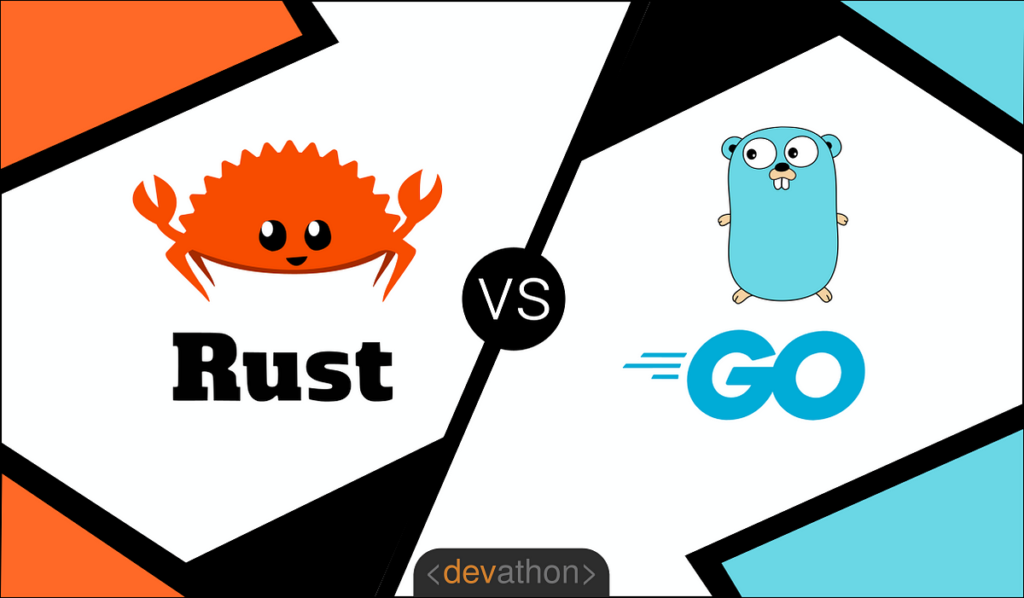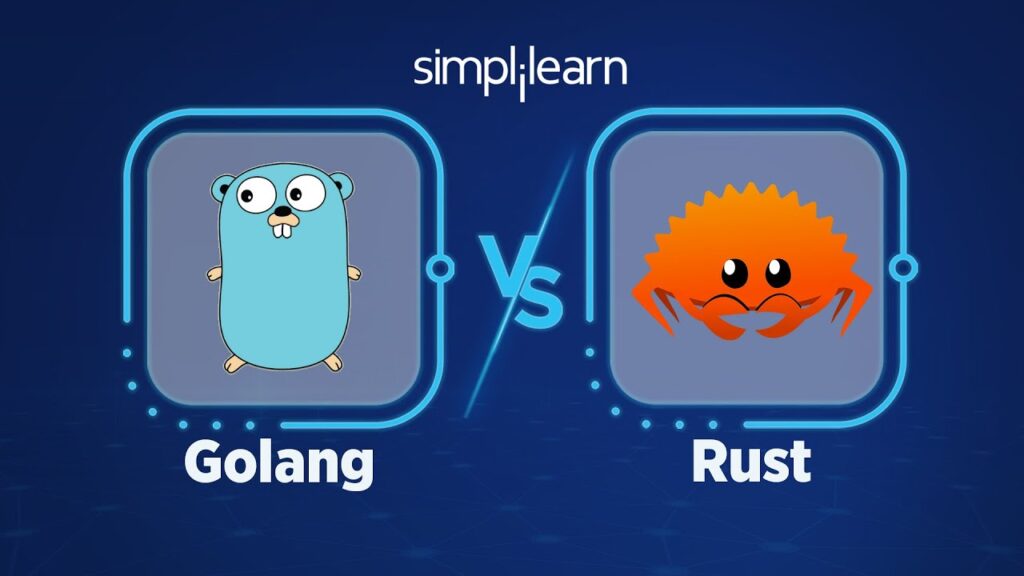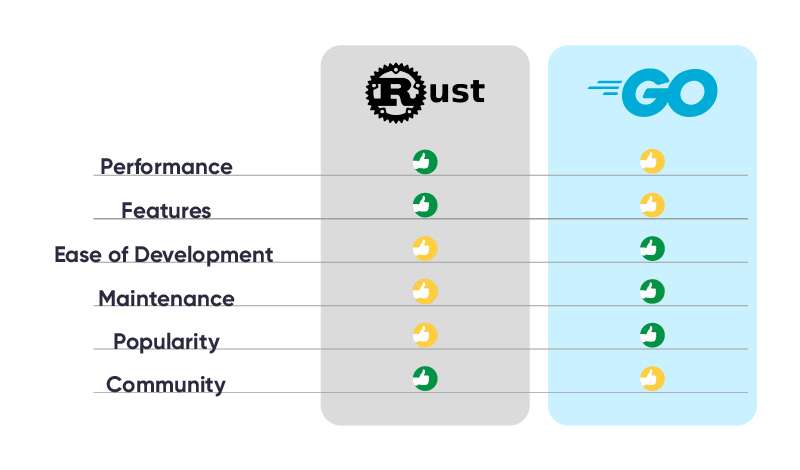Deciding between Go (Golang) and Rust depends on what you need for your project and what you prefer as a developer. Go is great for its simplicity and easy learning curve, making it perfect for building server-side apps, microservices, and web APIs quickly. It handles concurrency well and manages memory efficiently with garbage collection.
On the other hand, Rust focuses on performance, memory safety, and low-level control, which is good for systems programming and applications that need to run fast. Rust is a bit harder to learn because of its strict rules and ownership model.
So, if you want a language that’s easy to pick up and great for getting projects done fast, Go is a good choice.
What Is Go (Golang)?

Go, commonly known as Golang, is an open-source programming language introduced by Google in 2009. It was created by Robert Griesemer, Rob Pike, and Ken Thompson to simplify software development while maintaining efficiency and scalability. It is designed to address the challenges encountered with languages like C++ by offering a modern approach to building reliable and concurrent systems.
Key Features:
- Simplicity and Efficiency: Go emphasizes simplicity and ease of use, making it approachable for developers with varied backgrounds. It aims to reduce complexity and boilerplate code found in other languages like C++.
- Concurrency: It provides built-in support for concurrency with goroutines and channels, enabling developers to write highly scalable and efficient concurrent programs easily.
- Strong Standard Library: It comes with a comprehensive standard library that includes packages for networking, cryptography, web development, and more, enabling the rapid development of robust applications.
What Is Rust?
Rust is a multiparadigm, general-purpose programming language developed by Graydon Hoare and introduced by Mozilla Research. It focuses on safety, performance, and concurrency, making it particularly suitable for systems programming where reliability and efficiency are paramount.
It was officially released with version 1.0 on May 15, 2015, and has gained significant popularity among developers for its unique features.
Key Features:
- Safety and Memory Management: Its ownership system ensures memory safety by enforcing strict compile-time rules, preventing common programming errors like null pointer dereferences and data races.
- Performance: Rust provides fine-grained control over system resources and memory allocation without sacrificing performance, making it suitable for low-level systems programming.
- Concurrency: Its type system guarantees thread safety and prevents data races, allowing developers to write efficient and safe concurrent code.
- Community Adoption: It has been consistently voted as one of the most loved programming languages by developers in various surveys, reflecting its growing popularity and strong community support.
Performance
Go: Prioritizes fast compilation, which is beneficial for quick development cycles. It features a garbage collector that automates memory management, reducing the burden on programmers. However, this can lead to less predictable runtime performance due to garbage collection pauses.
Rust: Optimized for fast execution without the use of garbage collection, resulting in more consistent runtime performance. It is well-suited for applications where speed of execution is critical, such as game programming, operating system kernels, web browser components, and real-time control systems.
Developer Experience
Rust
Rust is known for its steep learning curve compared to languages like Go, JavaScript, or Python. The language prioritizes memory safety and low-level control, which can make code more complex, especially for developers transitioning from higher-level languages. Key aspects of Rust’s developer experience include:
- Memory Safety: Rust’s emphasis on memory safety requires developers to understand ownership and borrowing concepts, which can be challenging initially but ensures robust and bug-free code.
- Complexity: Passing pointers and managing memory manually in Rust can increase code complexity, especially for those new to systems programming or low-level languages.
Go
Go, designed with simplicity in mind, offers a more approachable learning curve compared to Rust, especially for developers coming from backgrounds in C++, Java, or similar languages. It strikes a balance between ease of use and performance, with features like garbage collection simplifying memory management. Key aspects of Go’s developer experience include:
- Simplicity: Go’s straightforward syntax and minimalist design make it easier to learn and use, making it a popular choice for rapid development and large-scale projects.
- Concurrency: Go’s built-in support for concurrency, with features like goroutines and channels, simplifies parallel programming and makes it easier to write scalable applications.
Development Speed
Rust
Rust’s steep learning curve may slow down initial development, as developers need to grasp concepts like ownership, borrowing, and lifetimes. Its strict compiler checks can lead to longer compilation times, especially for large projects. However, this trade-off ensures memory safety and prevents common bugs.
Go
Go’s simplicity and straightforward design facilitate faster development, making it suitable for projects with tight deadlines or rapid iterations. Its efficient compiler and garbage collector contribute to faster compilation times, supporting rapid development and quick feedback cycles.
Simplicity
Go: Designed to be simple with minimal syntax and language constructs. It’s easy to learn and productive, making it suitable for projects with short timescales or teams requiring rapid onboarding of new programmers.
Rust: Although more complex than Go, Rust is powerful and expressive, offering a wide range of features. It’s particularly advantageous for migrating large projects from traditional languages like C++ or Java.
Concurrency
Go: Built with built-in features for concurrent programming, such as goroutines (lightweight threads) and channels (efficient data communication between concurrent tasks). This makes Go well-suited for high-scale concurrent applications like webservers and microservices.
Rust: Also supports concurrency but requires explicit management of data sharing between different parts of the program. This approach ensures safety by preventing unintended unsafe operations.
Safety
Go: Provides automatic memory management through garbage collection, simplifying memory management but potentially introducing runtime unpredictability.
Rust: Ensures safety by design, preventing common bugs like data races through its borrow checker and strict type system. While this can be challenging for new Rust programmers, it leads to highly reliable and bug-free software, making it ideal for applications where safety and reliability are paramount.
Scale
Go was specifically crafted to facilitate scalability for projects and development teams alike. Its minimalist design fosters uniformity, while a well-established standard style ensures that any Go programmer can readily comprehend new codebases.
In large-scale software development, clarity outweighs cleverness. Go’s simplicity makes it an excellent choice for big organizations, particularly those with distributed teams.
Additionally, its fast build times support rapid testing and deployment, further enhancing its suitability for scaling projects efficiently.
Trade-offs
Rust and Go differ significantly due to the trade-offs made by their design teams:
Garbage Collection
Languages like Go prioritize ease of development with garbage collection, allowing for efficient program creation. However, unpredictable behavior and performance overheads can be drawbacks.
On the other hand, rust requires explicit memory management, making it ideal for real-time or high-performance applications where predictability and control are paramount.
Abstraction
While high-level abstractions simplify programming and enhance portability, some applications require precise control over hardware and execution. Rust offers control “closer to the metal,” enabling precise execution, while Go abstracts architectural details, allowing developers to focus on problem-solving.
Speed
Rust prioritizes execution speed, making design trade-offs for optimal performance. Go emphasizes simplicity, sacrificing some runtime speed for ease of use. The preference between Rust and Go depends on whether developers prioritize program build time or runtime performance.
Correctness
Both Go and Rust aim for program correctness, but through different approaches. Go provides a robust testing framework and a rich standard library, while Rust focuses on eliminating runtime bugs with its borrow checker.
While Go may offer easier program writing, it may result in more bugs compared to Rust, which enforces discipline on developers while offering flexibility in project management.
When to Use Go?

Go is particularly well-suited for certain types of projects and development scenarios:
- Server-Side Applications: Go excels in server-side programming, backend web development, databases, and network programming due to its efficient handling of concurrent requests using goroutines.
- Cloud Computing: Official support for Google Cloud Platform makes Go a strong choice for cloud-based applications and services.
- Web APIs and Microservices: Go’s built-in HTTP support enables developers to easily create APIs and deploy them as microservices.
Choose Go If:
- You value code simplicity and straightforward syntax.
- You prefer a language that handles large amounts of concurrent data efficiently.
- Execution speed is a priority for your application’s performance.
When to Use Rust?
Rust is well-suited for scenarios requiring high performance, memory safety, and low-level hardware interaction:
- Resource-Intensive Operations: Rust shines in managing machine resources for efficient processing of large data sets and CPU-intensive algorithms.
- Memory Safety: Rust’s strong memory safety features ensure reliable and bug-free code, though this can impact compilation speed.
- Algorithm Execution and Runtime Speed: Rust is favored for applications prioritizing runtime performance over compilation speed.
Choose Rust If:
- You prioritize algorithmic execution and runtime speed.
- Memory safety is a critical concern for your application’s reliability.
- You are comfortable with potentially longer development cycles due to Rust’s stringent compiler checks.
- You prefer working at a hardware-level to optimize performance.
FAQ’s
Which is better, Golang or Rust?
Both Go and Rust have their strengths and are suitable for different purposes. Go excels in simplicity, rapid development, and concurrency handling, making it great for server-side applications and microservices. Rust prioritizes performance, memory safety, and low-level control, making it ideal for systems programming and resource-intensive operations.
Should I learn Golang or Rust in 2024?
Both Go and Rust are niche languages in high demand. Rust offers better job security due to its difficulty and suitability for larger, more disruptive projects. Go, being easier to learn, is more suitable for smaller, well-defined projects. The choice ultimately depends on your career goals and project requirements.
Is Go more popular than Rust?
Yes, Go is four times as popular as Rust. However, popularity shouldn’t be the sole factor in choosing a programming language for a project. Consider factors such as suitability for the task, performance requirements, and developer familiarity when making a decision.
Final Words
Choosing between Go and Rust boils down to your project’s needs and your familiarity with each language. Go excels in simplicity, rapid development, and handling concurrency, making it great for server-side applications and microservices.
Rust prioritizes performance, memory safety, and low-level control, making it ideal for systems programming and resource-intensive operations. If you prioritize ease of learning and quick development, Go is a solid choice.
For applications demanding high performance and stringent memory safety, Rust offers a compelling option. Ultimately, the “better” language depends on your specific requirements and preferences.
